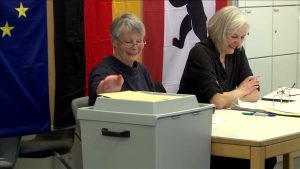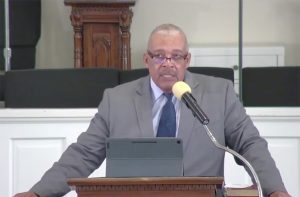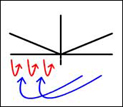“Nicaragua Betrayed” Summary— Chapter 4: The Unexpected
by Edward Ulrich
News of Interest.TV
February 8, 2011
This chapter describes how the U.S. took an isolationist attitude against Nicaragua after Richard Nixon’s Presidential Administration. Explained is how the U.S. sent a corrupt “Human Rights Commission” to Nicaragua during the Carter Administration that biased its findings for political reasons, and it is explained how friends of Nicaragua in U.S. Congress stood up for the truth and were able to reinstate military aid to Nicaragua that was being attempted to be cut off.
Following are key points from the chapter:
— At the end of 1975, Nixon was ousted from office due to the Watergate scandal, and Somoza laments that Nixon’s crimes were lies of an “internal nature,” but in contrast Carter’s falsehoods adversely affected nations around the world. “As a starter, Mr. Carter lied about Nicaragua; he lied about Iran; he lied about Israel; he lied about the Republic of China; and so on ad infinitum. For a long time to come, the United States will pay for the fabrications of Mr. Carter.”
— Immediately after the departure of Nixon, James Theberge was assigned as the new U.S. ambassador to Nicaragua. In his first visit, Theberge told Somoza that he was instructed to “keep his distance from him,” which came as a shock. The next shock was that Theberge started to associate and socialize with Somoza’s political adversary Pedro Joaquin Chamarro, the known Sandinista. Somoza explains that he thought at the time that such a change may have been because he had a good relationship with Nixon’s Administration and he is now somehow on a blacklist because of it.
— A staff member at the U.S. Embassy James Cheek who Somoza had problems with in the past during the earthquake was decorated with the Rifkin Foreign Service Award and given a metal because of his dissenting political reports out of Nicaragua, and Henry Kissinger was present at the ceremony.
— Despite those occurrences, Somoza was confident that the situation could be rectified, but that confidence soon dissipated when Carter and his new Secretary of State Cyrus Vance in the first month singled out Nicaragua as to no longer be able to receive military aid.
— Somoza reasoned that he would be able to rectify the situation with Washington using rational dialogue rather than being confrontational. “After all, we both had capitalistic states, we both had constitutional republics in which the President and the Congress were chosen through the democratic process, and both countries stood for individual liberty.”
— Ambassador Theberg was then replaced with Mauricio Solaun, and apparently his instructions were similar to Theberg’s of “not getting too close to Somoza.” Solaun wanted Somoza to invite the Human Rights Commission of the Organization of the American States (OAS) to Nicaragua, which raised many red flags with Somoza due to the recent slander attacks he had been receiving, and when he looked at the composition of the Commission, he knew the deck was stacked against him because it was headed by Aguilar of Venezuela.
— Somoza articulates his views on Jimmy Carter’s Human Rights Commission on pages 60-66, which are reproduced here:
I think people in the United States and elsewhere now understand that the Human Rights Commission is political. It shouldn’t be but it is. For example, the Commission went to Panama for an investigation. This visit to Panama was, without a doubt, politically motivated. Mr. Carter needed a favorable human rights report as to influence the U.S. Senate on the Canal Treaty vote. If you can imagine, Panama received a clean bill of health. I know Torrijos. I know that he is a dictator and I know that the people of Panama have few rights. They do not have free elections and basic individual rights are probably more flagrantly violated in Panama then in any country in Latin America. This is not a new thought on my part and it takes no great intellectual depth to comprehend the lack of human rights in Panama.
So when the Human Rights Commission came out with its glowing report on Panama, I was absolutely convinced the organization was strictly political and I wanted no part of it. The very name is a misnomer. If should be called the “Carter Hatchet Commission” because that’s what it is.
Conceptually, the idea of a Human Rights Commission is good. I’m convinced that the Western Hemisphere is blessed with people of good intentions, such as in the belief in the basic rights of all people. But if those good intentions are going to be manipulated for political purposes, like the Human Rights Commission is manipulated, you will have a lot of countries in upheaval. How can you have five people go into a foreign country, spend a few days, talk to a few selected people and come out with an honest report on the sociopolitical conditions in that country?
[Somoza gives an analogy of such a commission visiting the U.S., explaining how when all is said and done the U.S. could be made to look like Nazi Germany. “.. Naturally, such a report would not accurately represent conditions in the United States.”]
With the advent of the Carter Administration, a new phrase appeared on the international scene. That phrase was “Human Rights.” In speech after speech, Mr. Carter emphasized that the United States would, henceforth, concern itself with the rights of the people all over the world. In itself, that’s not a new concept, so far as human values are concerned. It was the first time, however, that the leader of a major power brought to the foreground the rights of the people, no matter where they might live. My first reaction, when I read of this bold new plan, was an affirmative response. After all, there are many parts of the world in which people are virtual slaves and have no rights at all. What harm could be done, than, if the spotlight of public opinion were focused on these areas?
[Somoza explains that he learned Carter’s program of Human Rights only applied to certain countries and the values changed from one area to another; with the “experts” having preconceived notions about a country before they even visit it based on political evaluations. They would determine a leader of a country guilty or innocent before even visiting based on their political agendas.]
“As the scenario begins to unfold, I thought it was time for me to take an introspective view of my own appraisal of human rights. How did I perceive human rights? What about human rights in my own country of Nicaragua? Had my government and I been guilty of violating the guidelines laid down by Mr. Carter? This meant that I had to examine my own philosophy in regard to my own people.
...
Since any discussion of human rights would relate to liberty, that, I felt, should be considered first. In the category of liberty, how did Nicaragua fare? Well, our people were free to work where they chose; they were free to travel about without any interference from the military or local constabulary; they were free to select their own doctor; education was free and, we might have strayed here, it was compulsory. They had the right of collective bargaining and they could go on strike, if they chose to do so. Though predominantly Catholic, our people could belong to the Church of their choice; they could choose their home and live where they desired. They could travel to other countries, and see how other people lived; and, very important, we had freedom of the press. In essence, they were free to do whatever they chose to do, so long as they didn’t trespass upon the rights of others. So far as liberty is concerned, I’m convinced we passed the test with flying colors.
...
It turned out that Mr. Carter didn’t see things the way we did in Nicaragua. He and his State Department wanted to send us political “experts” rather than people who understood what human rights are all about. The preconceived consensus— Nicaragua was in gross violation of human rights.
Mr. Carter was concerning himself with human rights in only the small and militarily weak countries. I made another observation. Generally speaking, these were anti-Communist countries such as Nicaragua, Chile, Argentina, and Paraguay. He didn’t concern himself with human rights in Russia or Red China. Doesn’t that seem a little strange?
...
... Since the United States sold Chiang Kai-shek down the river and turned China over to the Communists, literally millions of human beings have been slaughtered. The slaughter continues, and yet Mr. Carter doesn’t complain about the violation of human rights in China. In that huge nation, there is no freedom at all and the individual is as nothing.
If the value of a human being is important in Nicaragua, it should be just as important, if not more so, in the larger and more powerful countries.
To evaluate human rights properly, Mr. Carter doesn’t have to go to Nicaragua, Chile, or Argentina. What about human rights violations in the United States? To observe gross human rights violations, all one has to do is visit any Indian reservation in the United States. There you can see how those once proud people are treated by the Federal Government. The widespread exploitation of Mexican “wetback” labor force is certainly an area in which human rights are grossly violated in the United States.
When I think of the attention focused on my small country, I get angry. I get angry because I know that the people of Nicaragua are free— free to live, free to dream, and free to pursue happiness in their own way. Yet, Mr. Carter used the phony issue of Human Rights to turn much of the U.S. public opinion against me and my government. As a result of the policy, the people of Nicaragua are now devoid of human rights.
Now that the Communists have Nicaragua under control, the silence surrounding the Human Rights issue is deafening. Since the fall of my government on July 17, 1979, some three thousand men, women, and children have been slaughtered and buried in mass graves. This is now a matter of public record, so I cannot be accused of misrepresentation.
[Somoza explains that Jose Esteban Gonzalez, who was until recently the President of the Nicaraguan Permanent Commission on Human Rights that was in an opposition party of Somoza, stated publicly that in the city of Grenada where no fighting occurred that four hundred people were executed in the Sandinista takeover, and shallow mass graves were found in Leon, Masatepe, Nueve Guinea, Jinotepe, and Esteli. Gonzales then said this went on all over the country. Even Interior Minister Tomas Borge admitted there had been torture and illegal executions, however he played down the number of executions.]
The communists in Nicaragua didn’t want Gonzalez to disclose this horrible slaughter of human beings. In information released to the press, Gonzalez said: “They have told us to close down the Commission, they have tried to oblige me to resign, they have threatened other officials in other parts of the country, and some of our people have resigned. Today, there is tremendous fear in this country; and an equal fear admitting this condition exists,” Gonzalez added.
When I read facts such as these, I become nauseated. There is no way I can mentally remove myself from the suffering of the people of Nicaragua. How, I ask myself, can Carter and his crowd condone the Communist slaughter in Nicaragua? I listen, I listen very intently, but I do not hear one single protest of human rights violations out of Washington. Knowing the logic previously followed by Carter, perhaps there is an explanation. That logic would indicate that since the people of Nicaragua now have no rights at all, how can there be a violation of human rights?
The Human Rights issue, as advocated by President Carter, Patricia M. Derian, Mark Schneider, Bob Pastor, and the leftist news media, turned public opinion in the U.S. against me and my government. If their aim was to absolutely destroy human rights, if there aim was to assist in establishing a Communist base of operations in Central America, they were successful.
So when the Human Rights Commission came out with its glowing report on Panama, I was absolutely convinced the organization was strictly political and I wanted no part of it. The very name is a misnomer. If should be called the “Carter Hatchet Commission” because that’s what it is.
Conceptually, the idea of a Human Rights Commission is good. I’m convinced that the Western Hemisphere is blessed with people of good intentions, such as in the belief in the basic rights of all people. But if those good intentions are going to be manipulated for political purposes, like the Human Rights Commission is manipulated, you will have a lot of countries in upheaval. How can you have five people go into a foreign country, spend a few days, talk to a few selected people and come out with an honest report on the sociopolitical conditions in that country?
[Somoza gives an analogy of such a commission visiting the U.S., explaining how when all is said and done the U.S. could be made to look like Nazi Germany. “.. Naturally, such a report would not accurately represent conditions in the United States.”]
With the advent of the Carter Administration, a new phrase appeared on the international scene. That phrase was “Human Rights.” In speech after speech, Mr. Carter emphasized that the United States would, henceforth, concern itself with the rights of the people all over the world. In itself, that’s not a new concept, so far as human values are concerned. It was the first time, however, that the leader of a major power brought to the foreground the rights of the people, no matter where they might live. My first reaction, when I read of this bold new plan, was an affirmative response. After all, there are many parts of the world in which people are virtual slaves and have no rights at all. What harm could be done, than, if the spotlight of public opinion were focused on these areas?
[Somoza explains that he learned Carter’s program of Human Rights only applied to certain countries and the values changed from one area to another; with the “experts” having preconceived notions about a country before they even visit it based on political evaluations. They would determine a leader of a country guilty or innocent before even visiting based on their political agendas.]
“As the scenario begins to unfold, I thought it was time for me to take an introspective view of my own appraisal of human rights. How did I perceive human rights? What about human rights in my own country of Nicaragua? Had my government and I been guilty of violating the guidelines laid down by Mr. Carter? This meant that I had to examine my own philosophy in regard to my own people.
...
Since any discussion of human rights would relate to liberty, that, I felt, should be considered first. In the category of liberty, how did Nicaragua fare? Well, our people were free to work where they chose; they were free to travel about without any interference from the military or local constabulary; they were free to select their own doctor; education was free and, we might have strayed here, it was compulsory. They had the right of collective bargaining and they could go on strike, if they chose to do so. Though predominantly Catholic, our people could belong to the Church of their choice; they could choose their home and live where they desired. They could travel to other countries, and see how other people lived; and, very important, we had freedom of the press. In essence, they were free to do whatever they chose to do, so long as they didn’t trespass upon the rights of others. So far as liberty is concerned, I’m convinced we passed the test with flying colors.
...
It turned out that Mr. Carter didn’t see things the way we did in Nicaragua. He and his State Department wanted to send us political “experts” rather than people who understood what human rights are all about. The preconceived consensus— Nicaragua was in gross violation of human rights.
Mr. Carter was concerning himself with human rights in only the small and militarily weak countries. I made another observation. Generally speaking, these were anti-Communist countries such as Nicaragua, Chile, Argentina, and Paraguay. He didn’t concern himself with human rights in Russia or Red China. Doesn’t that seem a little strange?
...
... Since the United States sold Chiang Kai-shek down the river and turned China over to the Communists, literally millions of human beings have been slaughtered. The slaughter continues, and yet Mr. Carter doesn’t complain about the violation of human rights in China. In that huge nation, there is no freedom at all and the individual is as nothing.
If the value of a human being is important in Nicaragua, it should be just as important, if not more so, in the larger and more powerful countries.
To evaluate human rights properly, Mr. Carter doesn’t have to go to Nicaragua, Chile, or Argentina. What about human rights violations in the United States? To observe gross human rights violations, all one has to do is visit any Indian reservation in the United States. There you can see how those once proud people are treated by the Federal Government. The widespread exploitation of Mexican “wetback” labor force is certainly an area in which human rights are grossly violated in the United States.
When I think of the attention focused on my small country, I get angry. I get angry because I know that the people of Nicaragua are free— free to live, free to dream, and free to pursue happiness in their own way. Yet, Mr. Carter used the phony issue of Human Rights to turn much of the U.S. public opinion against me and my government. As a result of the policy, the people of Nicaragua are now devoid of human rights.
Now that the Communists have Nicaragua under control, the silence surrounding the Human Rights issue is deafening. Since the fall of my government on July 17, 1979, some three thousand men, women, and children have been slaughtered and buried in mass graves. This is now a matter of public record, so I cannot be accused of misrepresentation.
[Somoza explains that Jose Esteban Gonzalez, who was until recently the President of the Nicaraguan Permanent Commission on Human Rights that was in an opposition party of Somoza, stated publicly that in the city of Grenada where no fighting occurred that four hundred people were executed in the Sandinista takeover, and shallow mass graves were found in Leon, Masatepe, Nueve Guinea, Jinotepe, and Esteli. Gonzales then said this went on all over the country. Even Interior Minister Tomas Borge admitted there had been torture and illegal executions, however he played down the number of executions.]
The communists in Nicaragua didn’t want Gonzalez to disclose this horrible slaughter of human beings. In information released to the press, Gonzalez said: “They have told us to close down the Commission, they have tried to oblige me to resign, they have threatened other officials in other parts of the country, and some of our people have resigned. Today, there is tremendous fear in this country; and an equal fear admitting this condition exists,” Gonzalez added.
When I read facts such as these, I become nauseated. There is no way I can mentally remove myself from the suffering of the people of Nicaragua. How, I ask myself, can Carter and his crowd condone the Communist slaughter in Nicaragua? I listen, I listen very intently, but I do not hear one single protest of human rights violations out of Washington. Knowing the logic previously followed by Carter, perhaps there is an explanation. That logic would indicate that since the people of Nicaragua now have no rights at all, how can there be a violation of human rights?
The Human Rights issue, as advocated by President Carter, Patricia M. Derian, Mark Schneider, Bob Pastor, and the leftist news media, turned public opinion in the U.S. against me and my government. If their aim was to absolutely destroy human rights, if there aim was to assist in establishing a Communist base of operations in Central America, they were successful.
— Nicaragua was a free country with progress and patriotism, and its system of government, election laws, free enterprise, and even mode of wearing apparel were modeled after the U.S., and Carter was able to destroy it all, starting with inaccurate slander about human rights.
— Carter ordered the halt of shipments of arms to Nicaragua without even informing Somoza, who had to find out when it was attempted to pick up a shipment from a dealer.
— With the Washington nerve center of the Nicaragua opposition called the “Washington Office for Latin America” (WOLA) supplying massive disinformation, the support of Sandinista Priests in Nicaragua as well as leftists in U.S. Congress such as Ed Koch, David Obey, and Clarence Long, Carter then tried to make the Congressional move of halting the arms to Nicaragua in 1977. Somoza had to find legal assistance in Washington to fight the bill, which also included the countries of Argentina, Guatemala, El Salvador, Brazil, and Chile. Luckily, on June 23, 1977, Congressman Charles Wilson of Texas offered an amendment to the bill that simply stated, “On page 20, line 21, of the bill, in section 505, delete ‘Nicaragua.’” and the resolution was adopted, allowing Nicaragua to continue to receive arms shipments.
— Congressman Charles Wilson’s comments to Congress on June 23, 1977 are included in the book, where he explained that Nicaragua is not a gross violator of human rights and he drew attention to the fact that large opposition newspapers are allowed to be printed there, the elections are proven to be fair, and claims of the Nicaraguan clergy about human rights abuses are suspicious, among other issues.
— Somoza gives credit for the victory to the members of the House of Representatives who understood what the political battle was all about and voted in favor of Nicaragua, as well as the help of the Cuban community in the U.S. and friends of Nicaragua in many Spanish-American organization throughout the U.S.
— Somoza talks about using his influence to find a new Ambassador who would be fair with Nicaragua, and a former University Professor Solaun who was a naturalized citizen born in Cuba was recommended by an associate, but he turned out to be a bit over his head with the assignment and he tended to not be forceful enough, as well as not having an intimate enough knowledge of Nicaragua.
— The attitude of the Carter Administration toward the government of Nicaragua became more flagrant with each passing day, and Somoza explains how he was becoming very worried by the continual harassment, but he believed he would be able to improve the situation with the help of many friends in the U.S. Congress.
— In July 1977, Nicaragua was still making progress as they had started drilling their first geothermal field for electricity, and they just completed a feasibility study on a dam that would provide a ten-year supply of energy for Nicaragua, as well as building roads all over the country and opening new areas for development.
— Somoza did not anticipate that President Perez of Venezuela would then attempt to topple him— Venezuela had influence because of its oil, which allowed it to enlist the support of Columbia, Costa Rica, Panama, and other countries to apply extra pressure on Washington’s new position on Nicaragua.
— “I felt that Nicaragua was standing on the wrong side of a weak dam which was holding back an ocean of water. I knew if that dam should break, Nicaragua and all of Central America would be flooded out. ...”
— “At this point of confusion, doubt, stress, and constant pressure, I received a telling blow— right in the middle of my chest. I suffered a serious heart attack. That’s something for which you are never prepared.”
Purchase the book “Nicaragua Betrayed” from Amazon.com.








